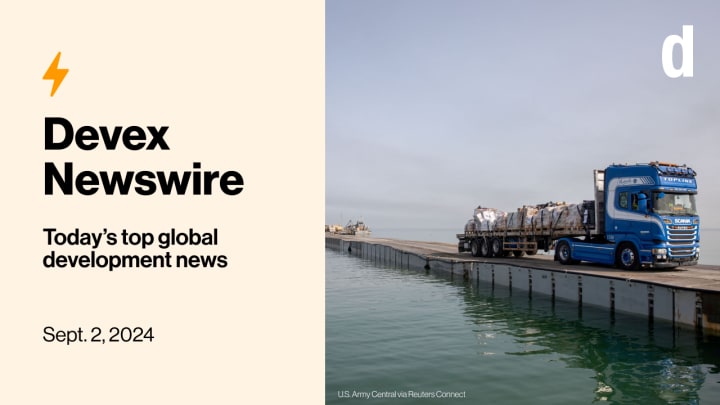
USAID staff were skeptical that a humanitarian maritime pier in Gaza would work. Those doubts were dismissed, even though many say they were ultimately justified.
Also in today’s edition: Another aid convoy comes under attack in Gaza, and Belgium may join the growing roster of European countries slashing foreign aid.
+ It’s time for our Devex monthly quiz wrap! How well did you keep up with the news last month? Take our quiz to find out.
Pier prescience
The U.S. government adores its acronyms. The temporary maritime pier that the Biden administration constructed to funnel aid into Gaza was dubbed the Joint Logistics Over-the-Shore system, or JLOTS. It might as well have been called “just a lot of problems” because it was riddled with them, from rough seas and security issues to the perceived militarization of the pier.
This is a preview of Newswire
Sign up to this newsletter for an inside look at the biggest stories in global development, in your inbox daily.
As a result, instead of the original plan to feed 1.5 million Palestinians over three months, the project only fed about 450,000 people over the 20 days it was in existence before being ignominiously decommissioned, my colleague Elissa Miolene writes.
You can’t say USAID didn’t warn them.
“Multiple USAID staff expressed concerns that the focus on using JLOTS would detract from the Agency’s advocacy for opening land crossings, which were seen as more efficient and proven methods of transporting aid into Gaza,” according to a new report by the agency’s Office of Inspector General.
That was largely the opinion of humanitarian organizations as well — who said the administration’s energy would’ve been better spent pushing Israel to allow more aid to flow into Gaza via already established but consistently blocked land routes.
“When every single second matters, and it’s a matter of hours — if not minutes — that some individuals can die, then speed and efficiency is of essence,” says Deepmala Mahla of CARE. “The pier was neither speedy nor efficient. And this was done despite several warnings, statements, and cries from the humanitarian community.”
Once the plan for a maritime corridor was set in motion though, the OIG report noted that USAID’s focus “was to use JLOTS as effectively as possible.”
JLOTS did move 20 million pounds of aid into Gaza, USAID tells us — one of the largest distributions of assistance during the period that the pier was operational. But that’s a far cry from what its planners had hoped for.
“Of course, there are going to be moments where you think, can we do something else? Is there any other way? But having spent time there, no,” says Mahla, who is speaking to Elissa just weeks after visiting Gaza. “There’s no alternative to a ceasefire and opening land borders if we are truly serious about facilitating the delivery of humanitarian aid.”
Read: USAID warned against building the Gaza pier. It happened anyway (Pro)
Background reading: Aid groups doubt Biden's pier will solve Gaza's problems (Pro)
+ A Devex Pro membership lets you access all our exclusive reporting and analyses, members-only events and networking summits, the world’s largest development job board, and more. Not yet gone Pro? Start your 15-day free trial now.
Convoys come under fire
Gaza continues to be a deadly terrain for humanitarian organizations. While the Israeli airstrike that killed seven World Central Kitchen workers garnered international headlines, more than 280 aid workers have been killed since the war began last October.
Most recently, an Israeli airstrike on Thursday killed four Palestinians in the lead vehicle of an Anera aid convoy carrying food and fuel to the Emirati Red Crescent Hospital.
“The coordinated and cleared transport plan called for unarmed security guards in the convoy, adhering to Anera’s strict standing agreement with Move One, our transit company,” according to a press release issued by Anera, which since 1968 has helped refugees and others affected by conflict in the Palestinian territories, Lebanon, and Jordan.
Anera said that initial reports indicate that four community members with Move One requested to take command of the lead vehicle, citing concerns that the route was unsafe and at risk of being looted.
The four community members were neither vetted nor coordinated in advance, and Israeli authorities allege that the lead car was carrying numerous weapons. The Israeli airstrike was carried out without any prior warning or communication.
“According to all the information we have, this is a case of partners on the ground endeavoring to deliver aid successfully,” says Anera President and CEO Sean Carroll. “This should not come at the cost of people’s lives.”
Also last week, a World Food Programme truck came under fire — an attack that came days after U.N. officials said the Israel Defense Forces fired toward a UNICEF vehicle.
Related reading: How 7 deaths changed aid work in Gaza
+ Explore our coverage of the humanitarian crisis in Gaza.
Mutually beneficial generosity
“International cooperation is not charity.”
— Jean Van Wetter, CEO of EnabelThe head of Enabel, Belgium’s federal development agency, used the self-interest angle to make the case that the country’s development spending benefits Belgium — after reports emerged that a new governing coalition could make cuts to foreign aid.
“There is a direct return on investment in terms of jobs, but also contracts for Belgian companies,” he writes on LinkedIn. “We estimate for example that Belgian companies sell each year many hundreds of millions of euros of goods and services to international organizations.”
Whether that will be enough to sway ascendent right-wing politicians remains to be seen.
Belgian media recently reported that negotiators trying to form a new government following elections in June — in which the right-wing New Flemish Alliance came first — were considering an economic plan designed to save €13.5 billion (nearly $15 billion). That reportedly includes €636 million from the development budget, my colleague Vince Chadwick writes.
Belgium spent 0.44% of its gross national income on official development assistance last year, which made it the 13th most generous donor as a proportion of GNI.
Should the cuts go ahead, they would follow a spate of major European donors slashing aid budgets of late, including the Netherlands, Sweden, France, and Germany.
Read: Belgian development chief says aid is ‘not charity’ as possible cut looms
ICYMI: Why are billions being cut from European aid budgets? (Pro)
Opinion corner
• “For too long, international development has been dominated by colonial languages. It’s time for international NGOs to walk the talk on localization by meaningfully embracing local languages,” according to the Translation Glossary Project team, which eschews Google Translate and instead relies on community members to cut through the development jargon.
• Solidarity is intrinsic to volunteering, writes Toily Kurbanov, executive coordinator of the United Nations Volunteers, who argues that volunteers tend to reject the “us vs. them” mentality that perpetuates a neocolonialist model in aid delivery.
• Today, more lives are lost from antibiotic resistance than from both HIV and malaria combined, write Otto Cars, Martha Gyansa-Lutterodt, and Stefan Swartling Peterson. They’re urging governments attending a high-level meeting on antimicrobial resistance at the U.N. General Assembly this month to take stock of the problem and make new commitments so the issue gets the attention it deserves.
• For development and humanitarian NGOs, “ensuring robust cybersecurity is not just a matter of operational efficiency but a fundamental aspect of safeguarding sensitive data and maintaining trust,” writes Philani Mdingi of Maverick Mind, outlining nine ways organizations can adopt a multifaceted approach to cybersecurity in this age of remote work.
+ Want to write an opinion article for Devex? Email us your pitch at editor@devex.com.
In other news
The U.N. released $100 million to address underfunded humanitarian crises in 10 countries, with more than one-third of the new funding going to war-affected Yemen and Ethiopia. [AP]
Weeks of flooding in Nigeria have killed nearly 200 people and devastated homes and farmlands, raising food insecurity, according to the country's disaster management agency. [Africanews]
The New Development Bank, established by BRICS, approved up to $1 billion in loans for water and sanitation infrastructure in South Africa. [Bloomberg]
Sign up to Newswire for an inside look at the biggest stories in global development.




